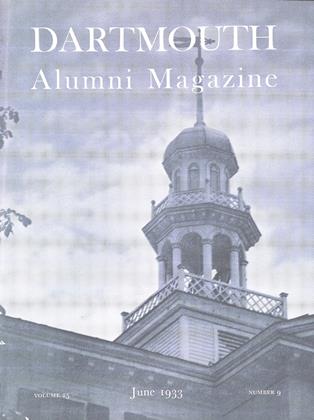By Edwin D. Harvey Ph.D., Assistant Professor of Sociology in Dartmouth College. New Haven, Yale University Press, 1933. Pp. 321, index.
Today when the situation in the Far East is so much in the public eye Professor Harvey's "The Mind of China," a study eagerly anticipated by the author's friends and colleagues, makes a particularly timely appearance. But "The Mind of China" is no hasty attempt to capitalize on a particular situation; rather it is the result of years of careful study, much of it made in China itself where the author was for seventeen years a member of the faculty of the College of Yale-in-China. Careful scholarship, much of which was done in the original Chinese sources, keen analysis, and sympathetic understanding combine with the broad sociological background of the author to make this a particularly readable book.
"The Mind of China," as the title implies, is not primarily a study of political or economic situations; rather it is an attempt to get behind the scenes and arrive at an understanding of the Chinese mentality that conditions such politico-economic problems. Professor Harvey finds the clue to Chinese attitudes in the peculiar magicoreligious nature of Chinese life. In the words of his book, "While China's problems indicate that under-development of the industrial and economic arts and overgrowth in population are the chief causes of China's present troubles, these two problems are nevertheless deeply conditioned by an inveterate animism."
Animism, it might be explained, is the belief in the reality of spirits and their effect upon human life. These spirits may be good or evil and may have their abode in both animate and inanimate objects. Life then becomes a constant attempt on the part of the individual to adjust himself to this imaginary spirit world by means of ritual, sacrifice, and magic. Again to quote Dr. Harvey, "It is the simple truth to say that every kernel of rice sown, every silk cocoon reared, every ton of coal mined, every pupil beginning his school career, and every death, is surrounded with high religious cult sanction and authority."
In illuminating fashion the author then describes the manifold forms which such a religious belief may take. Various types of souls or spirits, fetiches, both animate and inanimate, shamanism, or the possession of spirit power by inspired persons, charms, exorcisms, astrology, and augury, all these omnipresent features of Chinese life are treated in detail. A great deal of the illustrative material is drawn from ancient Chinese literature which Professor Harvey has studied in the original, and many instances also are cited from the author's experiences and observations in China. These little facets from China's complex culture constitute one of the most interesting features of the book. One is amazed to find preserved in the rich culture of present-day China a multitude of religious features ordinarily associated with the religious life of primitive peoples, but it should be remembered that Chinese culture, rich though it is, is also intensely conservative so that traits rooted in the hoary past still continue to function in China today.
While Professor Harvey has dwelt at considerable length on the more primitive aspects of Chinese religious life he has not stopped here. Ancestor worship, which for the Chinese grows logically from animism, is treated in detail as are the more formalized aspects of Chinese religion such as Buddhism, Confucianism, and other less well known cults and sects. Finally the book closes with an interesting chapter on the modern temper of China. As the author views it, "A new spirit is abroad in the land, and China is beginning to break with her antique past. Folkways a thousand years old are changing very slowly under the drive of an ous small minority and the machine age."
"The Mind of China" contains a wealth of material for the sociologist and the anthropologist, but it contains even more for the general reader who wishes to arrive at some intelligent understanding of the factors that influence the outlook of the people of China.
 View Full Issue
View Full Issue
More From This Issue
-
 Sports
SportsFOLLOWING THE BIG GREEN TEAMS
June 1933 -
 Article
ArticleHANOVER BROWSING
June 1933 By Rees Higgs Bowen -
 Class Notes
Class NotesClass of 1930
June 1933 By Albert I. Dickerson -
 Article
ArticlePIONEERING IN TELEGRAPHY
June 1933 By William U. Swan -
 Class Notes
Class NotesClass of IQ9 1
June 1933 By Jack R. Warwick -
 Article
ArticleSecretaries Convene
June 1933
Books
-
 Books
BooksBriefly Noted
JULY 1970 -
 Books
BooksPINES OF JAALAM.
May 1929 By Allan Macdonald. -
 Books
BooksPHYSICAL CHEMISTRY FOR PREMEDICAL STUDENTS
October 1946 By ANDREW J. SCARLETT '10. -
 Books
BooksHOW TO PLAY THIRD BASE
March 1943 By Fletcher Low'15. -
 Books
BooksDemystifying the Crisis
MARCH 1982 By Leonard L. Glass '64 -
 Books
BooksYOUR SON, CALVIN COOLIDGE A SELECTION OF LETTERS FROM CALVIN COOLIDGE TO HIS FATHER.
FEBRUARY 1969 By WILLIAM J. BRYANT '25


